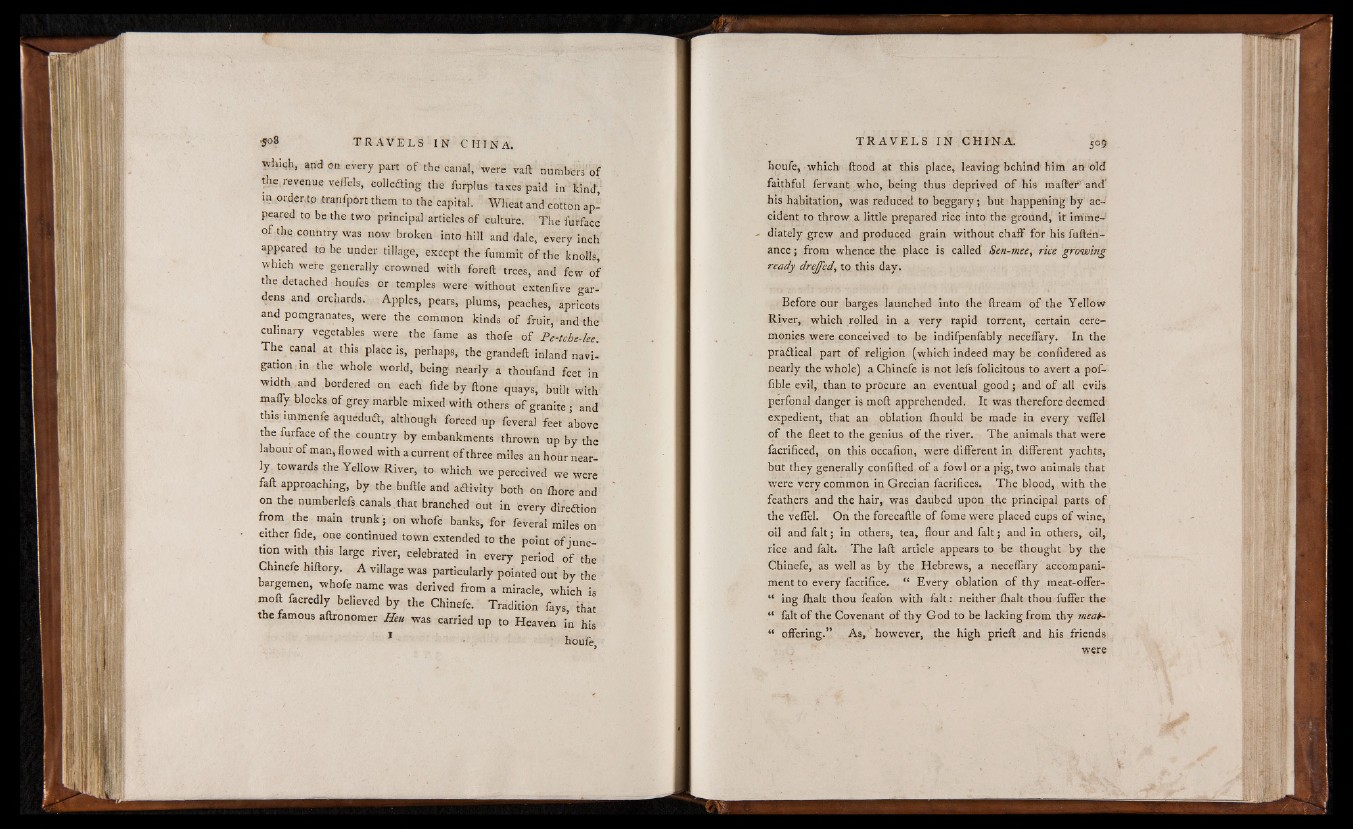
which, and on every part o f the canal, were vail numbers o f
the.revenue veffels, collefiing the furplus taxes paid in' kind,
in crder.to tranfpOrt them to the capital. Wheat and cotton appeared
to be the two principal articles o f culture. The furface
o f the country was now broken into hill and dale, every inch
appeared to be under tillage, except the fummit o f the knolls,
which were generally crowned with foreft trees, and few o f
the detached houfes or temples were without extenfive gardens
and orchards. Apples, pears, plums, peaches, apricots
and pomgranates, were the common kinds o f fruit, and the
culinary vegetables were the fame as thofe o f Pe-tche-lee.
The canal at this place is, perhaps, the grandeft inland navigation
in the-whole world, being nearly a thoufand feet in
width .and bordered on each fide by ftone quays, built with
maffy blocks o f grey marble mixed with others o f granite • and
this immenfe aquedu®, although forced up feveral feet ¡bove
the furface o f the country by embankments thrown up by the
labour o f man, flowed with a current o f three miles an hour near
ly towards the Yellow River, to which we perceived we were
fail approaching, by the buftle and adivity both on ihore and
on the numberlefs canals,that branched out in every direction
from the main trunk; on whofe banks, for feveral miles on
either fide, one continued town extended to the point o f junction
with this large river, celebrated in every period o f the
Chinefe hiftory. A village was particularly pointed out by the
bargemen, whofe name was derived from a miracle, which is
moft facredly believed by the Chinefe. Tradition fays, ¿hat
the famous aftronomer Heu was carried up to Heaven in his
1 - houfe,
houfe, which flood at this place, leaving behind him an old
faithful fervant who, being thus deprived o f his maHei? and'
his habitation, was reduced to beggary; but happening by accident
to throw, a little prepared rice into the ground, it immediately
grew and produced grain without chaff for his fuften-
ance; from whence the place is called Sen-mee, rice growing
ready drejfed, to this day.
Before our barges launched into the ftream o f the Yellow
River, which rolled in a very rapid torrent, certain ceremonies
were conceived to be indifpenfably neceffary. In the
pradical part o f religion (which indeed may be confidered as
nearly the whole) a Chinefe is not lefs folicitous to avert a pof-
fible evil, than to procure an eventual good ; and o f all evils
perfonal danger is moft apprehended. It was therefore deemed
expedient, that an oblation Ihould be made in every veffel
o f the fleet to the genius, o f the river. The animals that were
facrificed, on this occafion, were different in different yachts,
but they generally confifted o f a fowl or a pig, two animals that
were very common in Grecian facrifices. The blood, with the
feathers and the hair, was daubed upon the principal parts o f
the veffel. On the forecaftle o f fome were placed cups o f wine,
oil and fait; in others, tea, flour and fait; and in others, oil,
rice and fait. The laft article appears to be thought by the
Chinefe, as well as by the Hebrews, a neceffary accompaniment
to every facrifice, “ Every oblation o f thy meat-offer-
“ ing ihalt thou feafon with fait: neither ihalt thou fuffer the
“ fait o f the Covenant o f thy God to be lacking from thy meat-
“ offering.” As, however, the high prieft and his friends
were